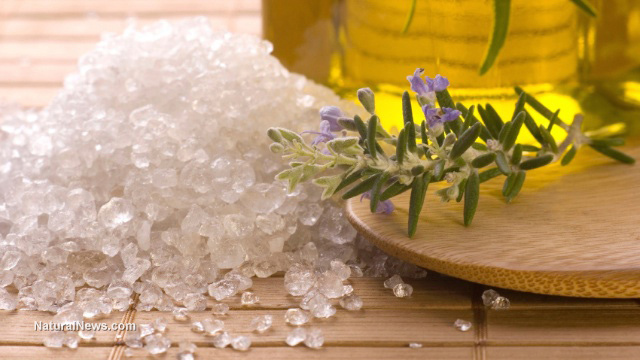How rosemary essential oil could help improve your brain and heart health
Tuesday, March 01, 2016 by: Harold Shaw
Tags: rosemary, essential oil, health benefits

(NaturalNews) Rosemary is an evergreen herb native to the Mediterranean, and a member of the mint family Lamiaceae, alongside oregano, thyme, basil and lavender. Although some of us are most familiar with the culinary uses of rosemary, this beautifully scented herb is also commonly used in cosmetics, perfumes and traditional medicine.
As a rich source of iron, calcium and vitamin B6, rosemary displays numerous health benefits and has been hailed by medics since ancient times for alleviating muscle pain, improving memory and boosting the circulatory system. Rosemary oil shares some of these uses, and makes an absolutely delightful addition to any aromatherapy kit.
Rosemary from ancient times to the present
In Ancient Greece, rosemary was considered to be one of the most important plants. Its name was derived from the Latin "rosmarinus," which translates into "dew of the sea." Although our ancestors were also impressed with this herb's wonderful fragrance and its tasty condiment qualities, in ancient times it was primarily used to improve memory. Students in Ancient Greece would braid it into their hair because they believed it would help them pass their exams. As it later turned out, they were right to do so.Shakespeare was also familiar with the beneficial link between rosemary and memory, which is why he mentioned the aromatic herb in Hamlet ("There's rosemary, that's for remembrance"). Famous herbalists throughout the ages recommended it for improving a patient's failing memory, while in Europe and Asia, it became a symbol for remembrance. As such, it would often be placed on graves by loved ones or offered by women to traveling men.
The potential health benefits of rosemary oil
As many of our ancestors rightly observed, rosemary was indeed linked to increased blood circulation and improved cognitive performance. A study from 2013 showed that even sniffing rosemary can improve memory by as much as 75 percent. In addition, the herb is a rich source of antioxidants and anti-inflammatory compounds, including carnosic acid, which is able to prevent free radical damage in the brain and significantly slow down brain aging.Rosemary essential oil also shows promising health benefits. It is known to help detoxify the liver and regulate the bile as a part of the digestive process, while relieving flatulence, stomach cramps and constipation. Rosemary oil can also be used for stress relief and reducing the levels of cortisol, as well as for pain relief, especially with rheumatism, sprains or joint aches. Last but not least, inhaling the scent of the oil can help with throat congestion, respiratory allergies, bronchial asthma, colds and the flu, due to its antiseptic action and antispasmodic effect.
Growing your own rosemary at home
Got a spare pot at home? Planting and growing your own rosemary is as easy as it gets, especially if you live in a warm climate. Otherwise, you can always bring the rosemary plant inside throughout the cold season, and you'll still be able to keep it green all year long. Once you've harvested your first rosemary herbs, you'll be able to dry them and use them as condiments, or transform them into a homemade essential oil.All you need are a few sterilized jars, a cup of rosemary and two cups of oil. If you'd like to use the homemade rosemary oil for cosmetic purposes, then you'll need some baby or almond oil to work with. For general purposes, you can utilize canola or safflower oil. At first, put your rosemary in the jar and cover it with the oil. Then, cap the jar tightly and place it in a warm spot (a sunny place, a windowsill or a warm cupboard). About one week later, when you notice the rosemary turning brown, take the cap off and smell the oil. If the smell is strong enough, strain it thoroughly and pour it in a clean jar. And voila! Your rosemary oil is ready to use.
Sources include:
MedicalNewsToday.com
DoItYourself.com
DigitalJournal.com
Rosemary at FETCH.news
Get independent news alerts on natural cures, food lab tests, cannabis medicine, science, robotics, drones, privacy and more.
Take Action: Support Natural News by linking to this article from your website
Permalink to this article:
Embed article link: (copy HTML code below):
Reprinting this article:
Non-commercial use OK, cite NaturalNews.com with clickable link.
Follow Natural News on Facebook, Twitter, Google Plus, and Pinterest
- Newly released JFK files reveal Pentagon's role in creating Lyme disease and covid in the same lab
- Trump nominates VACCINE ZEALOT Susan Monarez to lead the CDC, sidelining RFK Jr.'s reform efforts
- Obama accused of laundering USAID funds to fuel global protest movements, regime change operations
- HUGE: Putin claims 2020 election fraud in U.S. sparked Ukraine war, calls for peace talks with Trump
- Chris Rufo finally reveals abuse liberals unleashed on his wife and young kids...
- Deep State in disarray: Trump's funding freeze sows chaos, Democrats vow legal battle
- STARDUST, a secretive Israeli-US startup, plans risky solar geoengineering experiment to BLOCK OUT THE SUN
- Trump shows his true colors
- $2B Roundup verdict: A landmark blow to Bayer and a win for health freedom
- Trump's greatest betrayal so far: Accelerating Middle East wars, silencing dissent, and serving Zionist masters
- Outrageous government fraud: $312M in COVID loans went to children as young as 9 months old
- Festive flavors: The sweet history, nutritional profile and health benefits of pecan pie
- SWEET SABOTAGE: CIA's secret war on Soviet sugar revealed in JFK files
- Dr. Mike Yeadon releases 15-minute testimony - WATCH - about genocidal intent of COVID “vaccines”
- “Behind the Green Mask”: Rosa Koire exposes the hidden agenda of UN Agenda 21
- Elon Musk: Aliens could be here on Earth RIGHT NOW
- “Forever chemicals” in drinking water drive alarming cancer surge, new study warns
- A mysterious startup is developing a new form of solar geoengineering
- Newly released JFK files reveal Pentagon's role in creating Lyme disease and covid in the same lab
- Elon Musk: Aliens could be here on Earth RIGHT NOW
- Reclaim your health: How midlife exercise reverses years of inactivity
- Trump reverses course on Gaza plan, says “nobody is expelling Palestinians”
- EPA advisor admits the agency is funneling billions to climate groups ahead of Trump’s return to White House
- Big Pharma's $8 Billion bribery scheme exposed: how doctors are pushed to prescribe junk science, not heal
- Space war brewing? Russia threatens to destroy Starlink satellites
- A lack of integrity in Academia: Harvard professor found GUILTY of fraudulent research to promote CRT theory
- Survival 101: Effective EMF blocking techniques
- Rep. Nancy Mace introduces bill to ban biological males from female facilities on federal property
- Mike Adams Sermon 66: God will DESTROY ISRAEL for its wickedness
- Pilots report mysterious lights 'moving at extreme speeds' across Oregon skies
- 5 Simple steps to boost your brainpower: How to strengthen executive function in a distracted world
- Historian warns Israel may be entering an “IRREMEDIABLE DECLINE”
- Florida takes a stand: DeSantis proposes permanent ban on mRNA vaccine mandates
- RFK Jr.'s SSRI antidepressant investigation sparks liberal meltdown, exposes Big Pharma's dangerous game
- OpenAI whistleblower who dissented against how the company trained ChatGPT found dead
- Sugarcane extract superior to cholesterol-lowering drugs?
- EPA advisor admits the agency is funneling billions to climate groups ahead of Trump’s return to White House
- The Health Ranger releases “Vaccine Zombie” song and music video, using AI-animated zombies for the music video
- California's social media censorship law struck down: A victory for free speech or a threat to online safety?
- Dr. Mike Yeadon releases 15-minute testimony - WATCH - about genocidal intent of COVID “vaccines”
- The pandemic as a tool for INDOCTRINATION: Understanding “The Indoctrinated Brain” by Dr. Michael Nehls
- Mike Adams releases country western hit single: Goin’ Back in Time is Comin’ Home
- Mike Adams releases music poetry sensation: A Child of God
- RFK Jr. clears key hurdle: Sen. Susan Collins backs controversial HHS nominee, signaling a new era for health policy
- Florida takes a stand: DeSantis proposes permanent ban on mRNA vaccine mandates
- Unpacking the Lies That We’ve Been Fed – new song and music video released by Mike Adams, the Health Ranger
- Mike Adams releases new song and music video: Nothing More Disgusting Than a Globalist
- Congratulations to the FULLY UNVACCINATED as you resisted the COVID-19 PROPAGANDA MACHINE fueled by over $100 BILLION
- “Why we influenced the 2020 elections”: Facebook files reveal the coordinated effort to bury the Hunter Biden laptop story
- Michigan sheriff announces criminal investigation into 2020 election crimes, Dominion Voting Systems
- Israeli soldiers accused of even more torture and abuse in the West Bank
- Migrants are taking advantage of recent hurricanes to scam residents and loot their homes
- House Intelligence Committee calls for the ARREST and PROSECUTION of Dr. Anthony Fauci
- Peter Rost exposes Big Pharma corruption in his book “The Whistleblower: Confessions of a Healthcare Hitman”
- Red Cross issues warning to stop blood plasma donations from vaccinated people
- Scientists confirm: GENIUS brain function can be spontaneously unleashed in humans without any apparent cause
- EPA advisor admits the agency is funneling billions to climate groups ahead of Trump’s return to White House
- HYSSOP: What research reveals about the health benefits of this ancient holy herb
- Two containers with completed ballots fall out of truck in Florida
- Fully vaccinated about to see “tsunami” of illness and death, warns virologist
- Global leaders unite to clamp down on “misinformation” with UN-backed Cascais Declaration
- BREAKING: 2025 NDAA authorizes mandatory military draft of WOMEN across America… as Pentagon pursues global NUCLEAR war with both Russia and China at the same time
- Michael Yon warns of a ZIONIST TAKEOVER in Trump’s second administration
- BOMBSHELL: DNA testing kits are a SCAM to develop ethnic-specific bioweapons
- Ozempic and Wegovy weight loss drugs are injectable LIZARD VENOM PEPTIDES that may unleash a devastating wave of organ failure… side effects align with symptoms of SNAKE BITES
- Israeli soldiers accused of even more torture and abuse in the West Bank
- These 13 countries just signed an agreement to engineer a global FAMINE by destroying food supply
- NASA admits that climate change occurs because of changes in Earth’s solar orbit, and NOT because of SUVs and fossil fuels
- RFK Jr. clears key hurdle: Sen. Susan Collins backs controversial HHS nominee, signaling a new era for health policy
- Sermon 30: How Jesus reveals Caesar’s FAKE CURRENCY and FALSE AUTHORITY
- Coriander seeds: Ancient medicine backed by modern science
- Arizona officials claim Maricopa County needs 10-13 days to tabulate results of the election
Science News & Studies
Medicine News and Information
Food News & Studies
Health News & Studies
Herbs News & Information
Pollution News & Studies
Cancer News & Studies
Climate News & Studies
Survival News & Information
Gear News & Information
News covering technology, stocks, hackers, and more



"Big Tech and mainstream media are constantly trying to silence the independent voices that dare to bring you the truth about toxic food ingredients, dangerous medications and the failed, fraudulent science of the profit-driven medical establishment.
Email is one of the best ways to make sure you stay informed, without the censorship of the tech giants (Google, Apple, Facebook, Twitter, YouTube, etc.). Stay informed and you'll even likely learn information that may help save your own life."
–The Health Ranger, Mike Adams












































